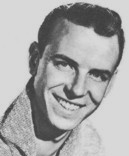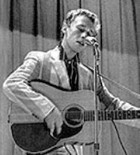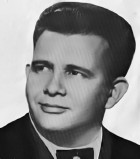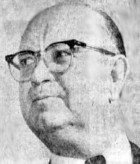
Single on CBS, on the Sydney charts Sept-Oct 1963. B-side of Seein’ Is Believin’. Produced by Sven Libaek.
Johnny Rebb (Donald Delbridge, 1939-2014), known as The Gentleman of Rock’n’Roll, was signed by EMI for one single on Columbia in 1958 before joining Sydney entrepreneur Lee Gordon’s Leedon and Lee Gordon labels. Noelene/Hey Sheriff was his first Leedon single, released at the end of 1958, and gave him his first charting single early in 1959. He became a regular on Johnny O’Keefe’s Six O’Clock Rock, even filling in as host in JO’K’s absence.
Johnny Rebb had been retired from the music business for many years when he died in July 2014.
See also: Highway of Love (1959).
Backing is by Sydney band The Atlantics. They were best known for their surf instrumentals, notably their Libaek-produced hits Bombora [YouTube] and The Crusher [YouTube] (both 1963), but they were also heard on records behind various solo artists from August 1963, including several by Johnny Rebb. Later, Rebb sang with The Atlantics, for example on their charting single I Put A Spell On You (1966).
Disambiguation: This is not the Johnny Rebb who released at least one single on New Orleans label Flame in 1959.
Further reading: 1. Johnny Rebb obituary at Sydney Morning Herald. 2. Johnny Rebb by Ken Sparkes at Juke Box Saturday Night’s Rock and Roll Heaven.
Suggestion from Terry Stacey. Thanks to Stephen McParland for clarification and additional detail.
 Single on Columbia in USA, on Coronet in Australia. Also released by Columbia on 78 rpm disc.
Single on Columbia in USA, on Coronet in Australia. Also released by Columbia on 78 rpm disc.
Ronnie Self (1938-1981) was a talented rock-rockabilly-pop performer who recorded many singles but never saw chart success in the US. He had two Top 40 singles in Sydney, Australia in 1958 with Ain’t I’m A Dog (#31 Sydney, #21 Australia*) and Bop-A-Lena (#25 Sydney, #63 USA), and he is still highly regarded by rockabilly fans, especially in Europe.
He is also remembered for his songwriting, especially for Brenda Lee’s breakthrough hits Sweet Nothin’s (1960, #4 USA) and I’m Sorry (1960, #1), then for Everybody Loves Me But You (1962, #6).
A co-writer credit to Self’s (and Brenda Lee’s) manager Dub Allbritten appears on Sweet Nothin’s and I’m Sorry, as well as on the lesser hits Eventually (1961, #56) and Anybody But Me (1961 #31). This seems to have been a financial arrangement rather than a collaboration.
Dub wasn’t a songwriter, but his name is listed as the co-writer on a lot
Brenda Lee in her autobiography Little Miss Dynamite (2002) p.64
of Ronnie’s songs. I don’t think he was trying to be dishonest.That was
the only way Dub could hope to recoup all the money he’d invested in
that crazy guy.
Jake Hess’s recording of a Ronnie Self composition, Ain’t That Beautiful Singing (1969), won the Grammy Award for Best Sacred Performance (Non-Classical).
Why Ronnie Self never made it as a performer is one of the great mysteries and injustices of pop music history… He should have been there, thought of in the same breath as [Carl] Perkins or Jerry Lee Lewis; instead, he’s a footnote in rock & roll history outside of Europe, where he’s treated as a legend.
– Bruce Eder, All Music
The writing credits 1. Wayne Paul Walker (1925-1979) recorded as a country-rockabilly singer on a number of labels from the mid-50s, but his greatest success was as a songwriter, mainly in country music. He started recording and writing when he was appearing on Louisiana Hayride on KWKH Shreveport. In 1954, his first record came out on Chess, and he co-wrote How Do You Think I Feel (with Webb Pierce), recorded by country star Red Sovine (1954) and by Elvis Presley on Elvis (1956). By 1956 Walker was living in Nashville, signed as a writer for Cedarwood publishers, and recording for Columbia, Coral and Brunswick.
1. Wayne Paul Walker (1925-1979) recorded as a country-rockabilly singer on a number of labels from the mid-50s, but his greatest success was as a songwriter, mainly in country music. He started recording and writing when he was appearing on Louisiana Hayride on KWKH Shreveport. In 1954, his first record came out on Chess, and he co-wrote How Do You Think I Feel (with Webb Pierce), recorded by country star Red Sovine (1954) and by Elvis Presley on Elvis (1956). By 1956 Walker was living in Nashville, signed as a writer for Cedarwood publishers, and recording for Columbia, Coral and Brunswick.
Some notable Wayne Walker compositions from a large repertoire include:
• Are You Sincere (Andy Williams, 1958 #3 USA; Elvis Presley 1973 on Raised On Rock);
• Cut Across Shorty (Eddie Cochran 1960; Rod Stewart 1970 on Gasoline Alley, co-wr. Marijohn Wilkin;
• Little Boy Sad (Johnny Burnette 1961, #17 USA; MPD Ltd 1965).
 2. George Sherry is a pseudonym of Troy Lee Martin (1911-1977) a Nashville music publisher, talent scout and producer who in the 30s had been a singer, comedian, and wild west show manager. His writer credits, which appeared on many works he published or produced, used several aliases including George Sherry, Jerry Organ, and Shirley Lynn, as well as variations of his real name.
2. George Sherry is a pseudonym of Troy Lee Martin (1911-1977) a Nashville music publisher, talent scout and producer who in the 30s had been a singer, comedian, and wild west show manager. His writer credits, which appeared on many works he published or produced, used several aliases including George Sherry, Jerry Organ, and Shirley Lynn, as well as variations of his real name.
The All Music biography (my main source), noting that Martin’s involvement in country music has never been properly recorded, traces various roles in several companies from the post-war 1940s to the early 70s. It mentions numerous songs that he brought to prominence, and concludes that he had the undoubted ability to select a hit song.
Ain’t I’m a dog?
The wording of the title Ain’t I’m A Dog can be baffling, and I’ve seen examples where chart compilers have tried to correct it, to Ain’t I A Dog or (less convincingly) Ain’t Me A Dog.
I’d assumed it was unique to this song, but in fact the construction isn’t unheard of in American English. It has been discussed at length at the linguistics forum Language Log, where other examples are given, such as “Ain’t this is a great country…”
In a post headed “Ain’t I’m a Stinkah”, Eric Bakovic writes that Ain’t I’m a Dog [makes] perfect sense if you take ‘ain’t’ to be a phrase-initial marker meaning something like “isn’t it the case (that)”, “don’t you agree (that)”, “it’s clear (that)”, or the like — observe: “It’s clear that I’m a dog; I’m always steppin’ around.“
I don’t pretend to understand all of that, let alone the whole discussion thread, but you can follow it up here if you’re game. Links back to previous posts are included there.
* Charts: I’m no statistician but the chart positions #31 Sydney (The Book and Gavin Ryan) and #21 Australia (Top 100 Singles using AMR) look like an anomaly, but they are all I have.
References, further reading: 1. Ronnie Self story at This Is My Story which led me to the Brenda Lee quote. 2. Ronnie Self: Biography by Bruce Eder at All Music. 3. Ronnie Self by Dave Stephens at Toppermost. 4. Ronnie Self – Bop-A-Lena at Michael Jack Kirby’s Way Back Attack. 5. Wayne Walker page at This Is My Life. 6. Wayne Walker discography at 45cat.com. 7. Wayne Walker: selected discography with audio samples and label shots at Rockin’ Country Style. 8. Troy Martin aka Troy Lee Martin: Biography (uncredited) at All Music. 9. Troy Martin at Discogs.com. 10. Eric Bakovic, Ain’t I’m A Stinkah, post at Language Log, 2004 (scroll down).
One of five tracks by eclectic Sydney R&B-rockabilly band on the album The Best Of The Inner West,
The album, dedicated to the people and pubs of the Inner Western suburbs of Sydney, was produced by Tony Grose for Piranha Bros Records. Also contributing tracks were The Bopcats and The Layabouts.
The Ratbags Of Rhythm appear to have been particularly active around 1982-83. The Piranha Bros website describes them as the consummate pub band with a diverse and danceable repertoire.
In addition to their pub gigs, they appeared at the University of Sydney, Bondi Pavilion and Martin Place, and on radio stations 2JJJ and 2MBS. In 1983 they released a six-track EP on audio cassette, Dingoes Revenge .
The line-up listed on the album sleeve is Bridie King (piano, piano accordion), Matt Bienstock (guitar, vocals), Bruce “Chester” Smith (bass), Greg Fitzgerald (drums), Steve James (acoustic, lap & steel guitar, vocals), Dick Hodge (sax), Tony Press and Judy Hill (lead vocals).
Lead vocals on Ain’t I’m A Dog are by Tony Press.
Bridie King has had a long and distinguished musical career and has continued to perform and record well into the 2000s. Her Facebook page was advertising Rhythm & Blues Old Skool gigs up until September 2025 last time I looked.
Ratbags Of Rhythm guitarist Matt Beinstock wrote the band’s original songs. These included I’ll Be A Baby For The Dingo In Your Heart and Not Me, both performed at a 2021 reunion gig and posted by Bridie King at YouTube along with commentary about the band. ♫ Watch at YouTube
The Ratbags were a delightfully quirky band which broke all the molds, covering and writing original rockabilly, ska, blues, boogie, Australiana and more …
Bridie King at YouTube
Ratbags?
You may come across other Australian bands called The Ratbags. Ratbag is old Australian slang for a person of eccentric or nonconforming ideas or behaviour, says Australia’s national dictionary The Macquarie.
Sources, further reading:
1. Ratbags Of Rhythm at the Piranha Bros Records website.
2. “Ratbags of Rhythm”, Tharunka, 7 March 1983 p. 25.
3. Chris Spencer et al, Who’s Who of Australian Rock, 5th edition (2002), p. 318.
4. Bridie King biography at Kimbo’s Women of Aussie Music.
See also: Leichhardt Hotel gig poster at Mark’s blog 1980s Sydney Gig Posters.
Track on Check This Action! by prominent rock-rockabilly-roots band from Austin, Texas, formed 1981. See also 1984 UK single release on Demon.
Further reading: Band bio at All Music.
Some other later versions (see SecondHandSongs):
• Johnny Green’s Blues Cowboys (Australia, 1999);
• Jerry Williams (Sweden, 2002);
• John Lindberg Rockabilly Trio (Sweden, 2006).